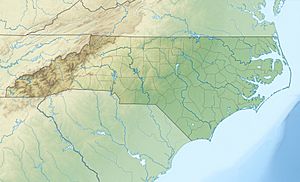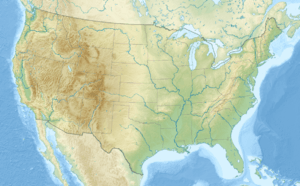Sandy Creek (Deep River tributary) facts for kids
Quick facts for kids Sandy Creek |
|
|---|---|
|
Location of Sandy Creek mouth
|
|
| Other name(s) | Tributary to Deep River |
| Country | United States |
| State | North Carolina |
| County | Randolph Guilford |
| City | Ramseur |
| Physical characteristics | |
| Main source | Climax Creek divide Pond about 1 mile east of Climax, North Carolina 805 ft (245 m) 35°54′39″N 079°41′23″W / 35.91083°N 79.68972°W |
| River mouth | Deep River Ramseur, North Carolina 435 ft (133 m) 35°45′55″N 079°40′18″W / 35.76528°N 79.67167°W |
| Length | 19.94 mi (32.09 km) |
| Basin features | |
| Progression | generally south |
| River system | Deep River |
| Basin size | 60.03 square miles (155.5 km2) |
| Tributaries |
|
| Bridges | Old Red Cross Road, Hollow Hill Road, Ramseur-Julian Road, US 421 (x2), Old Liberty Road, Ramseur-Julian Road, Kidds Mill Road, Low Bridge Road, Mulberry Academy Street, E Main Street, US 64-NC 49 |
Sandy Creek is a river in North Carolina, about 19.94 mi (32.09 km) long. It flows through Guilford and Randolph Counties. Sandy Creek is a "tributary," which means it's a smaller river that flows into a larger one. It joins the Deep River. An important historical event, the Battle of the Mouth of Sandy Creek, happened near where this creek meets the Deep River in July 1781.
Contents
About Sandy Creek
Sandy Creek is considered a "4th order" tributary. This means it's part of a river system where smaller streams flow into bigger ones. It's like branches on a tree, with Sandy Creek being one of the larger branches feeding into the main trunk, the Deep River.
Where Sandy Creek Starts and Ends
Sandy Creek begins in a pond. This pond is located about 1 mile (1.6 km) east of a town called Climax, North Carolina. This starting point is in Guilford County.
From there, the creek flows generally south. It crosses into Randolph County. Finally, Sandy Creek meets the Deep River in the town of Ramseur, North Carolina.
The Land Around Sandy Creek
The area that Sandy Creek drains is called its "watershed." This watershed covers about 60.03 square miles (155.5 km2) (155.5 km²) of land. This is the total area where all the rain and water eventually flow into Sandy Creek.
The region gets about 46.8 inches (119 cm) of rain each year. About 48% of the land in the Sandy Creek watershed is covered by forests. This means there are many trees along its banks and in the surrounding areas.
A Bit of History: The Battle of Sandy Creek
An important event from the American Revolutionary War took place near Sandy Creek. This was the Battle of the Mouth of Sandy Creek. It happened in July 1781.
This battle was a small but significant clash. It involved American forces and British Loyalists. The Loyalists were people who supported the British during the war. This battle was part of the larger conflict for American independence.
 | Calvin Brent |
 | Walter T. Bailey |
 | Martha Cassell Thompson |
 | Alberta Jeannette Cassell |



